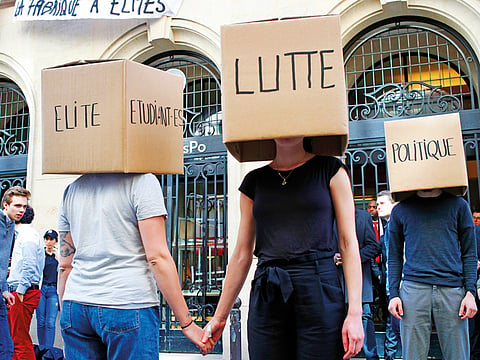Spreading student protests, train strikes pressure Macron
Top university blocked by protesters over varsity reforms which critics see as part of rollback of public services

Paris: Train drivers, public sector workers and students sought to pile pressure on French President Emmanuel Macron on Wednesday as fresh stoppages on the railways and new protests disrupted travel and universities.
Students occupied the prestigious Sciences Po university in Paris overnight, the latest campus to be blocked by protesters over university reforms which critics see as part of a rollback of public services.
“Sciences Po students against Macron’s dictatorship,” read a banner hung from a window of the Paris university, which has groomed generations of French politicians, including 40-year-old Macron.
The protest, which follows weeks of sit-ins and demonstrations at several universities around the country, came as railway workers launched a fourth round of strikes which led to mass cancellations nationwide.
One in three high-speed TGVs and one in four intercity trains were scheduled on Wednesday and Thursday.
Eurostar services to London will be only marginally affected however, with four out of five trains set to run as announced.
On Thursday, civil servants, workers in state retirement homes and students have all been called to demonstrate — the second in a month after a day of protests on March 22 which brought around 300,000 onto the street, according to police figures.
Unlike last time, the Paris metro also faces disruptions on Thursday.
Adding to the growing picture of defiance, the head of the energy branch of the hardline CGT union, Sebastien Menesplier, also announced Wednesday that workers were looking at “targeted” power cuts.
Macron, who sees his own credibility as a reformer on the line as he prepares to mark the first anniversary of his presidency on May 14, has insisted he will not back down on his bid to shake up the big-spending public sector.
The ambitious young centrist, elected at the head of his own party last May, is also facing resistance in Europe to his plans to shake up the European Union where Germany has cooled on some of his plans.
On Tuesday, he received a rousing endorsement from the French parliament, however, where members of the lower house voted overwhelmingly in favour of his reform of the heavily indebted state rail operator SNCF.
The bill sailed through the National Assembly with 454 votes for and 80 against the government’s plans to scrap jobs-for-life and early retirement guarantees for new SNCF hires.
“Democracy is calling on the unions to find a solution that moves things forward, not backwards,” Labour Minister Muriel Penicaud told France 2 television as the fourth instalment of rolling rail strikes got underway.
Since the beginning of April train drivers and other rail workers have been walking off the job two days out of every five.
They have vowed to continue until at least June 28.
Students meanwhile are up in arms over changes allowing universities to select candidates for degree courses, calling it a violation of the principle of free education for all.
The various protests are still however a far cry from the mass public sector strikes that forced a right-wing government to withdraw pension reforms in 1995, or May 1968 when a revolt by students and workers turned Paris into a battleground.
Macron is hoping that the rail reform, which now moves to the Senate, will be passed quickly, taking the wind out of the protesters’ sails.
He is largely backed by public opinion, with 61 per cent of respondents to a recent Ifop poll saying they wanted the government to push through the changes.



